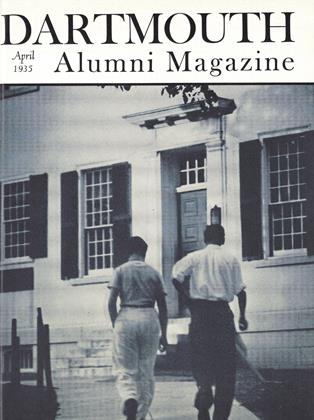TAKE YOUR CHOICE of the seasons in Hanover. Put yourself to a vote on the best month of all. If all of us did that, we'd probably decide on April by a sizeable margin. It isn't just the idea of youth and spring—the sap bursting forth and all that sort of thing. As it seems now, April was the month when everything was right; winter left behind and exams still a bit ahead. For one thing, there was music in the air.
Hums on the campus weren't always the success that they should have been. Perhaps they are now or perhaps they simply don't exist any more. The four classes lined up in a hollow square and took turns at "Sweet Rosie O'Grady" and "I've Been Working on the Railroad" and "Where, O Where" and a bunch of other old stand-bys. And after the formalities had been properly carried out, Art O'Neil, Sherm Adams, Bob Elsasser and any others at hand with suitable vocal equipment would make an independent round of their own.
Werner Janssen was playing the piano in the A. A. Club. We didn't fully appreciate then how much extra we were getting with our meals, but we knew that a tune of Werner's called "Dancing Honeymoon" stood up very well under constant battering by every known type of musical instrupersonal Sal and Breg the Ohman and Arden of their time could do wonders with it. There was another about the "Little Town That I Call Mine" that Jerome Kern wouldn't have turned up his nose at.
It must be comparative bedlam now, with radio turned loose in every fraternity house. In those days the victrola was the thing, and the variety and quality of the records had a lot to do with the size and the respectability of the delegations. Allen's throve on its phonograph business, and provided day-long entertainment gratis for a congenial group of hangers-on. Jeff Lawrence, Jim Stark, Ned Pearson and others were invariably around to keep the machine cranked up. There was a witless song of Bert Williams' about the moon shining on the moonshine that never failed to give satisfaction.
Frightful musical comedies came to the Junk, willing in spirit but weak in flesh. Yet such were the simple pleasures of the day that a bandy-legged chorus in the White River Opera House always played to an appreciative audience. Occasionally our, more sophisticated souls pee-raded off to Boston and came back whistling such tender ballads as "Just a Voice to Call Me Dear," "Babes in the Wood" and "Auf Wiedersehn."
"The Dartmouth Song" was still the Dartmouth song, but it was losing ground before a rising tide of appreciation of the literary significance of Richard Hovey. "Men of Dartmouth" was on the way up. Some of us took the conservative side: our cradles had been rocked and our infant yelps smothered to the roar of "Come fellows, let us raise a song." We were bewildered, too, when we learned upon arrival in Hanover that the stentorian Wah-Hoo-Wah of our forefathers had become, if not degenerated into, an explosive Wa-a-a-a-a.
Like every other Dartmouth generation, we no doubt set our own share of precedents, which bothered those who had gone before us and remained to be broken by those who came after. Even without a stein to go with "The Stein Song," it was a great life in the spring when the slush finally melted away, and the boardwalks came up, and the pindling wire fences were strung up to protect the fresh crop of grass. It must be getting just about right up there now.
Strolling About Hanover in theSpring
 View Full Issue
View Full Issue
More From This Issue
-
 Article
ArticleHANOVER BROWSING
April 1935 By Herbert F. West '22 -
 Article
ArticleSTABILIZATION BY SPECIE PAYMENTS
April 1935 By Edward Tuck '62 -
 Class Notes
Class NotesClass of 1908
April 1935 By L. W. Griswold -
 Class Notes
Class NotesClass of 1910
April 1935 By Harold P. Hinman -
 Class Notes
Class NotesClass of 1918
April 1935 By Allan C. Gottschaldt -
 Class Notes
Class NotesClass of 1929
April 1935 By F. William Andres
R. M. Pearson '20
-
 Article
ArticleNot So Long Ago
October 1934 By R. M. Pearson '20 -
 Article
ArticleNot So Long Ago
March 1935 By R. M. Pearson '20 -
 Article
ArticleNot So Long Ago
November 1935 By R. M. Pearson '20 -
 Article
ArticleNot So Long Ago
February 1936 By R. M. Pearson '20 -
 Article
ArticleNot So Long Ago
March 1936 By R. M. Pearson '20 -
 Article
ArticleNot So Long Ago
June 1936 By R. M. Pearson '20
Article
-
 Article
ArticleA Wah Hoo Wah!
July 1954 -
 Article
ArticleStudents in Foreign Business
DECEMBER 1962 -
 Article
ArticleSwimming
JANUARY 1959 By CLIFF JORDAN '45 -
 Article
ArticleDark Horse of a Different Color
April 1980 By David M. Shribman '76 -
 Article
ArticleThe Undergraduate Chair
MARCH 1968 By JOHN BURNS '68 -
 Article
ArticleCOLLEGE HAS DUTY
May 1935 By W. J. Minsch Jr. '36

